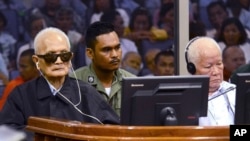A U.N.-backed tribunal in Cambodia has upheld life sentences given to two former leaders of the Khmer Rouge regime for crimes against humanity.
Khieu Samphan, the former head of state, and Nuon Chea, second in command to Khmer Rouge leader Pol Pot, were originally sentenced in 2014 in connection with charges of extermination, enforced disappearances and political persecution.
The Supreme Court Chamber's top judge Kong Srim said Wednesday the life sentences were appropriate, and that the two men showed a "complete lack of consideration for the ultimate fate of the Cambodian population."
Chea and Samphan are the most senior Khmer Rouge officials still living. They are also on trial in a second case involving genocide charges. Their lawyers argued the 2014 conviction was tainted by errors and biased judges, and while Wednesday's decision noted some problems, the overall verdict remained the same.
The court also said the decision not to subpoena Heng Samrin, the president of the National Assembly who was once a Khmer Rouge commander, was “erroneous.”
The final ruling, which was applauded as it was read out, cannot be appealed.
Chan Socheata, the only survivor of her 15 family members who were imprisoned under Pol Pot's rule, recalled starvation, persecution and forced labor.
"I was only a little bit relieved,” to hear Wednesday's ruling, she told VOA. “Prison nowadays is not like during the Khmer Rouge regime, in which we had the right to work but not to eat.”
Keng Ly, 68, who arrived to observe the verdict on behalf of loved ones, said his “feelings are somehow soothed.”
“Yet if we talk about the suffering … it was non-stop,” he recalled. “But this is a modicum of justice—that I can accept.”
The sheer cruelty of the crimes, he added, are bound to continue haunting him.
“They put forth a killing policy to resolve issues, and I still don’t think I can ever fully understand this policy," he added. "Whether it was for propaganda or whatever, I still don’t understand.”
Chea and Samphan are the only senior officials convicted for crimes of the regime, with Ieng Sary and Ieng Tharith—both influential Khmer Rouge figures—dying before they could stand trial.
Trial criticized
The U.N.-backed tribunal has been criticized for the pace at which it has prosecuted cases and for overspending.
Since 2006, more than $260 million has been spent on the court.
Following Wednesday’s announcement, Chan Tani, secretary of the Council of Ministers, said the convictions were a testament to the tribunal's success.
“It is important to prevent such tragedies from happening again at any time or in any country,” he said.
David Scheffer, special rapporteur for the U.N. secretary general at the Khmer Rouge tribunal, said the verdict should be seen as a warning to other totalitarian governments around the world today.
“Perhaps the leadership of North Korea should take particular note of what occurred here today,” he said.
The Khmer Rouge oversaw the deaths of an estimated 1.7 million Cambodians between 1975 and 1979.
This report was produced in collaboration with VOA's Khmer Service.




